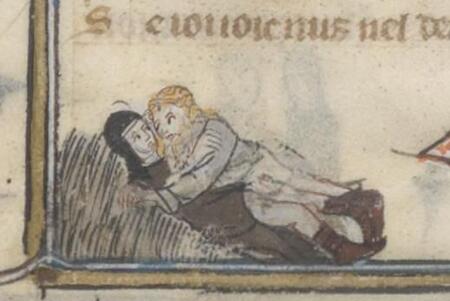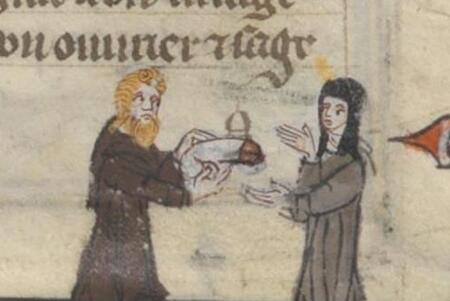Course Instructor: Dr Claire Kennan - c.kennan@queensu.ca
In Summary:
According to medieval values, the very purpose of life was to prepare for the afterlife by avoiding sin. This course encourages students to consider how medieval people prepared for an afterlife by trying to remain ‘sin-free’ while also having their basic human desires fulfilled. It asks them to consider what can we learn about the Middle Ages from exploring life through these two interrelated themes.
![]()
![]()
Course Highlights: 
-
Through the close examination of primary source material including legal cases, medical texts, liturgy, literature, art and archaeology, students will consider how sex and death affected medieval societies from a variety of perspectives.
-
Issues of gender, sexuality and space will be central to discussions along with the themes of violence, mortality and disease.
-
Students will consider how sex and death have shaped modern misconceptions regarding the medieval era using original source material to challenge the use and abuse of the ‘medieval’ in video games including Assassin’s Creed (2007 -), TV shows such as Game of Thrones (2011-19) and The Witcher (2019-) and films including The Last Duel (2021).
Course Information:
 Few would question that life’s greatest drives are to reproduce and to avoid death. Both Sigmund Freud and Michel Foucault have famously argued that the two are fused, that the death instinct pervades sexual activity. But how did this play out in the past? It is often said that the past is a foreign country where they do things differently, and perhaps no type of ‘doing’ is more fascinating than sexual desires and behaviours, particularly in an era we often associate with either swooning love-struck knights and ladies on the one hand, or base, violent ‘medieval’ deviance on the other.
Few would question that life’s greatest drives are to reproduce and to avoid death. Both Sigmund Freud and Michel Foucault have famously argued that the two are fused, that the death instinct pervades sexual activity. But how did this play out in the past? It is often said that the past is a foreign country where they do things differently, and perhaps no type of ‘doing’ is more fascinating than sexual desires and behaviours, particularly in an era we often associate with either swooning love-struck knights and ladies on the one hand, or base, violent ‘medieval’ deviance on the other.
While sex in the Middle Ages may (or may not) have been kept behind closed doors, death was at the very centre of medieval life. With high rates of infant mortality, disease, famine, the constant presence of war, and the inability of medicine to deal with common injuries, death was a brutal part of most people's everyday experience.
Learning Outcomes:
After completing this course, students should be able to:
- Demonstrate primary source research skills (both online and in person).
- Develop thoughtful and compelling arguments based on primary sources and secondary reading.
- Clearly communicate complex knowledge through variety of means to specialist and non-specialist audiences.
- Analyse the Middle Ages from multi- and interdisciplinary perspectives.
- Create public-facing digital outputs which challenge preconceptions about the Middle Ages.
- Evaluate influences of medievalism and neo medievalism on our understanding of the Middle Ages.
Experiential and Active Learning Opportunities:
Weekly seminars will provide students with the opportunity to engage with primary source materials (in translation) and to hone their skills in primary research through the use of digital archives and databases. Our close proximity to London allows for easy access to museums, archives and galleries to engage with medieval documents and objects first-hand. Possible embedded experiential learning will include visits to the Wellcome Library and the Vagina Museum.
Prerequisites and Exclusions:
Level 2 standing or above. There are no exclusions for this course.
Course applicable to the following Majors/Medials/Minors:
HIST (option)

